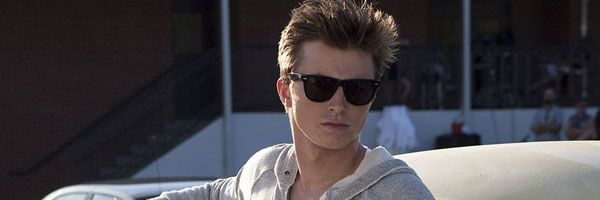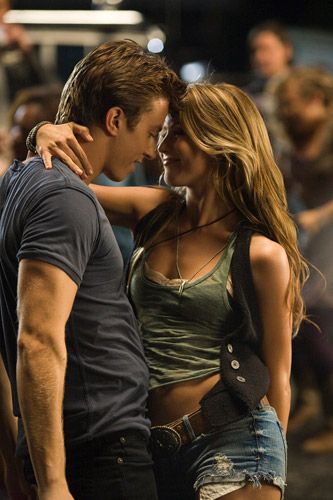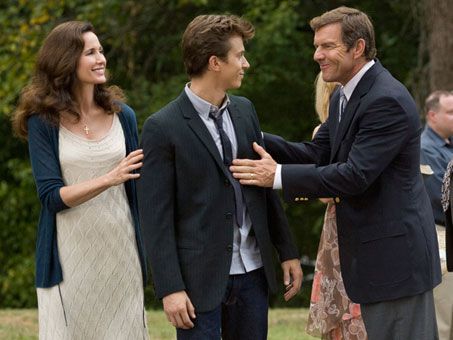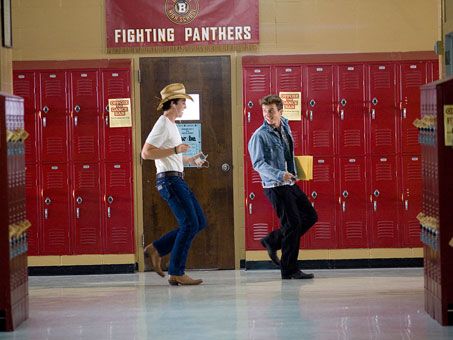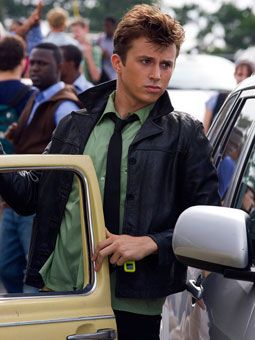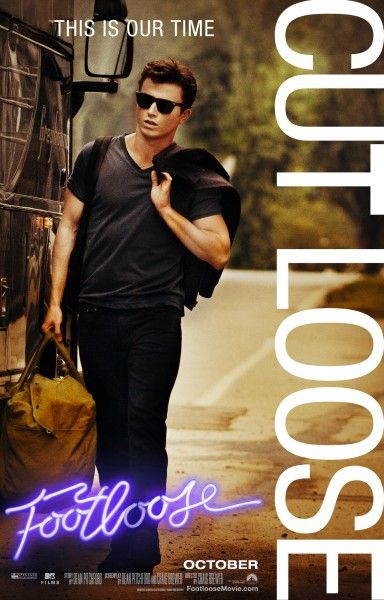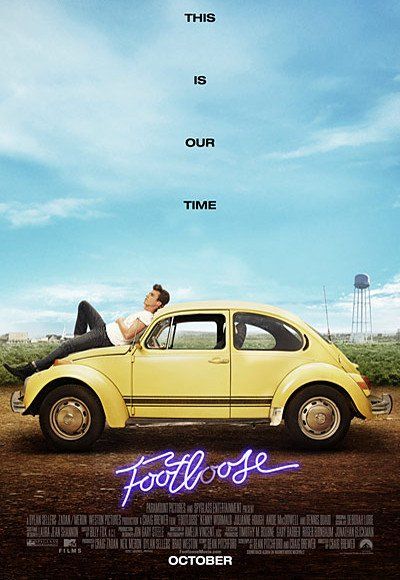As soon as acting newcomer Kenny Wormald heard that they were looking for an unknown for the lead role of Ren MacCormack in co-writer/director Craig Brewer’s take on the 1984 classic Footloose, he did everything he could to insure that he would get an audition and fought as hard as he could, before finally being the lucky guy to land the role. And, by casting beyond established actors, audiences will really identify with the characters and get lost in the updated, yet totally true-to-the-original, story.
At the film’s press day, Kenny Wormald sat down with Collider for this exclusive interview to talk about getting bitten by the acting bug, being put on hold for the role while they tested another already-established actor, how he found out he’d get to play the character while he was golfing so he threw his clubs and ran around like a madman, that he and co-star Julianne Hough had each other’s backs during filming, and what an incredible time he had shooting the “angry dance” sequence. He also talked about his next film, the thriller Someone in the Dark, which is his role without any dancing. Check out what he had to say after the jump.
Here’s the film synopsis:
When Ren MacCormack (Kenny Wormald) is transplanted from Boston to the small southern town of Bomont, he experiences a heavy dose of culture shock. A few years prior to his arrival, the community was rocked by a tragic accident that killed five teenagers after a night out, and Bomont’s local councilmen and the beloved Reverend Shaw Moore (Dennis Quaid) responded by implementing ordinances that prohibit loud music and dancing. Not one to bow to the status quo, Ren challenges the ban, revitalizing the town and falling in love with the minister’s troubled daughter Ariel (Julianne Hough) in the process.
Question: At what point in your dance career did you get bitten by the acting bug? Was it something you’d always had the goal of doing?
KENNY WORMALD: Yeah, I always had the goal of doing it and, growing up at a dance studio – the one I did, anyway – we always did musical theater and had drama classes within the faculty. It was always there, but it was just more about opportunity. I had been working predominantly and steadily as a dancer, so after awhile, you don’t have to audition. I was just in that world, and I had certain goals I wanted to reach, but I definitely always wanted to keep going and challenge myself and become an actor. I got the first experience and opportunity doing Center Stage 2, which was a straight-to-DVD dance film, but it was the best acting class I could have had, just being on set and learning everything about it, like the flow of a set, and being the guy instead of the guy behind the guy. That was the first time that I really was like, “Okay, I can do this and I want to keep doing that.”
Did it help keep you in your comfort zone a bit because you still had that dance element there?
WORMALD: Yeah, it was a great crutch to have. I look forward to doing roles, after this, without it, but for the first couple of times, it was very helpful.
How did you learn that they were looking for a lead for Footloose?
WORMALD: Once they stopped the musical version, I knew that they were opening casting for unknown actors. They wanted to find someone who wasn’t already a celebrity, and who wasn’t in 10 movies. Once I heard that, I bee-lined it for the role and insured that I was in the room. I was jealous of the other guys that were attached. I didn’t realize it was going to be a musical, at that time. I didn’t know what it was. I just heard that they were remaking Footloose, and Zac Efron and then Chace Crawford were attached. I was like, “Damn, man, I want to do that! I’m a dancer. I think I can do it justice.” So, once it opened up, I was pumped. There are a lot of naysayers about the remake, but we were true to the original. I can’t imagine the negativity towards the musical version. It probably would have been more severe.
What was the auditioning process like for this? Did you have to really fight for this role?
WORMALD: Oh, yeah! I auditioned a lot because they wanted to make sure they made the right decision. Half-way through the casting process, they tested another actor who was already-established, so I got put on hold and I was like, “Damn, there it goes!” It didn’t work out, for whatever reason, and they called me back in, which is when I danced for them. Once I danced for them, I saw a shift and got a little more confident. I was working with my acting coach, sometimes twice a day, right before the audition. I just wanted to really make sure that my dancing was up to par with what I could bring on the dance side of things. That’s how it went down. And then, my final audition was with Julianne and Miles. They had already booked it, and I had to screen test at Paramount. It was down to two guys, and I had to go in there and dance a little bit with Julianne and do the scenes, and do the scenes with Miles, and then just pray for the phone call. And, I got it.
What was your reaction, when you found out that you were going to play Ren McCormack?
WORMALD: I was golfing and I threw my clubs and ran around like a madman, or like a little kid who had just gotten a PlayStation on Christmas. It was surreal. I’ll never forget it. It was a three-way call from my agent and manager, and I was just screaming and yelling. And, they were like, “But, you can’t tell anyone for a week!” I was like, “What?! Thanks for telling me, but damn, it’s going to be hard not to tell anyone.” Paramount wanted to release the word themselves, so I had to wait and hold back. I called my dad the next day – it was Father’s Day – and I was like, “Dad, don’t tell grammy. Don’t tell auntie. Don’t tell anyone.” That’s how it went down.
What was it like to work with Craig Brewer, who was such a fan of the original?
WORMALD: I give Craig Brewer all the credit in the world because he pitched his idea of Footloose and was like, “If you want me to do Footloose, I’m going to do Footloose.” With a lot of the issues from the original, I don’t think Paramount even realized how meaningful the original actually was. It wasn’t just dancing and hair and this whole Kenny Loggins thing. It was way deeper than that. That’s what Craig wanted to tap into, and thank god for Craig Brewer.
In what ways could you most identify with Ren, and how are you different from him?
WORMALD: I’ve always fought for what I believe in. I used to get made fun of for dancing, and I would argue back, or fight the kids, or do whatever I had to do to shut them up. I have that in me. I’m from Boston, and I’m hard-headed, opinionated and a good arguer. As for not relating to Ren, thank god, my mom is here. I have my mom, and I’ve never had to move away and feel like such an outsider and have no one. Luckily, I’ve never had to deal with that.
Was it challenging to do choreography, but have it look totally spontaneous and natural?
WORMALD: Yes and no. The dancing stuff, honestly, was a bit easier for me. Ren isn’t technically a professional dancer. I think he could get away with it more than the other kids in the town. But, we wanted it to be organic and not so forced on you, like, “Here comes the big dance number.” The cool part about this was that it wasn’t all jazz hands and perfect alignment. It was important to look great, but not be so perfect and precise. During the angry dance, I fell and had to get back up. That element was exciting for me to play around with.
How technically challenging was the angry dance sequence?
WORMALD: We had a great crew, who helped out with that so much, and a bunch of stunt guys down in Georgia, who are pros. They made sure I was totally safe. But, I was swinging from that chain with a harness on, two levels up, over nothing. I was like, “I hope you guys know what you’re doing because I don’t!” It was tough. There are a lot of things that look great, but were hard. There was a stunt dude there who did the gymnastics flip ‘cause I couldn’t do that. I was going to try, but they wouldn’t let me. He was doing the fall off of the chain. Craig wasn’t happy with what was happening, so I was like, “Craig, let me do it. Let me just do the fall. I’m a dancer. I know how to fall. I can make it look real.” So, I got to do a lot of it, as well as the stunt guys. That was fun. It was the most intense solo, ever. Even in the original, it’s perfect and pristine. It’s not raw. It doesn’t have that element of failure, where you have to get back up. But, it was a blast! It was the last three days of shooting. It was incredible. As beat up as I was by the end, I would have done the whole thing, all over again.
Did you ever wonder if they saved that until the end of filming, in case something happened?
WORMALD: I didn’t wonder, I knew. That’s what they said. They were like, “We’re just going to make this the last three days of shooting, just in case. We’ll have the movie in the can. If you die, we’re good. We’ll just tribute it to you and it will be fine.”
In order to avoid the inevitable comparisons to Kevin Bacon, were there things that you set out to do differently with your performance?
WORMALD: Yeah, I think Craig’s decision to keep my accent was cool. That’s how I speak and it’s where I’m from, so it was a natural thing for me to speak like that, and I think that separates it, right off the bat. And then, there are plot things that allow me to be my own Ren. His mom passing away, prior to where the film begins, is why he moved down there. I think that’s a key change, and it allows you to understand a few more things. Also, the relationship that he has with his uncle and the family is different than the original, so that helps set it apart. In the original, the uncle and Ren butt heads and the uncle is absolutely not supportive. In this one, he wants to be supportive. The uncle really does look out for him and care for him. Things like that help. I didn’t watch the original film in the two or three months after I booked it. I knew the film and had seen it 100 times, but I had my script and I wanted to make sure I wasn’t mimicking his words and that the delivery wasn’t exact. You don’t want to mimic, as hard as that might be. Obviously, people will compare, but I’m cool with it. I’m confident in our film, and proud of it.
What was it like to work with Julianne Hough and develop the relationship between your characters? Did it make it easier that she’s a dancer, too?
WORMALD: Yeah, it did. When we met, they just made us dance at the first audition. That was kind of awkward, but both being dancers, you figure it out right away. And, all the dance rehearsals, prior to shooting, were such a good environment because you just get to know people. There’s no guard up. It’s not like you’re having dinner and have to say the right thing. We were just dancing, bumping into each other, and stepping on each other’s feet. The guard goes down quickly, when you do that. It was great. We had each other’s backs. All of the young cast was great, and we were all supportive. There were no egos or awkwardness. The set was, by far, the coolest set I’ve been on. I’ve been on a ton, as a dancer, and I know they’re not all like that. We were all happy and having fun. It was real. It wasn’t forced.
What was it like to work with Miles Teller and build the friendship between your characters?
WORMALD: As soon as I booked the film and we knew that we were both going to be in Georgia doing our thing, we found out that we’re neighbors in L.A. – he lives two or three streets away from me – and we just started hanging out. We started golfing, chillin’, playing Madden, talking smack to each other. That comradery was just so natural. By the time we were shooting, we were already damn near best buds. By the end, he’s now a friend of mine forever. It didn’t feel like we were working. It was just fun. And, he’s a funny bastard, so he made the set nice and light. We were all young, there were no egos, and none of us were too famous. Julianne had a bit of fame, and Miles had done one other film, but we were all new and fresh and happy to be there. We all helped each other out, in that sense.
Have you thought about where you would like to go next, in your career?
WORMALD: Yeah, absolutely. I want to continue to act in films. I just got attached to a film, called Someone in the Dark, which is a really cool, sexy thriller. There’s no dancing in it, so I’m honored to even get that opportunity. It says a lot about Footloose, and Craig Brewer’s Footloose, that there was acting in it and it’s not just dance. I got offered a dance movie and I respectfully turned it down because I want to keep excelling. Footloose is definitely the launch pad that I’ve always dreamed about, and I think it’s a perfect fit. I definitely want to be around for awhile. Will I never dance again, in a movie? No, I’d love to. If it makes sense, like Footloose does, I would definitely love to do it. Maybe when I’m older, I can do some Christopher Walken dancing.
Since you’ve been there, what would you tell other young dancers who have dreams of doing what you’ve now had success at, but have people telling them that it’s impossible?
WORMALD: Well, I would just say that it is possible. Whenever I teach – which I still do – I tell the kids, “I was right there, seven years ago, or whatever, in a dance class or at a dance convention. It’s so possible. If you just take as many classes as you can, and you work hard and don’t have an ego, and don’t piss anyone off while you’re on a job, you’ll be fine. That’s the best advice. Just go for it! If you don’t, you’ll be like, “What if?” I limited the, “What if?,” thing and just kept pushing myself and trying to excel. That’s what you have to do. You have to be determined, and be able to accept, “No.” I’ve heard, “No,” a thousand times, and I’ve heard, “Yes,” a handful of times. That’s my advice.

